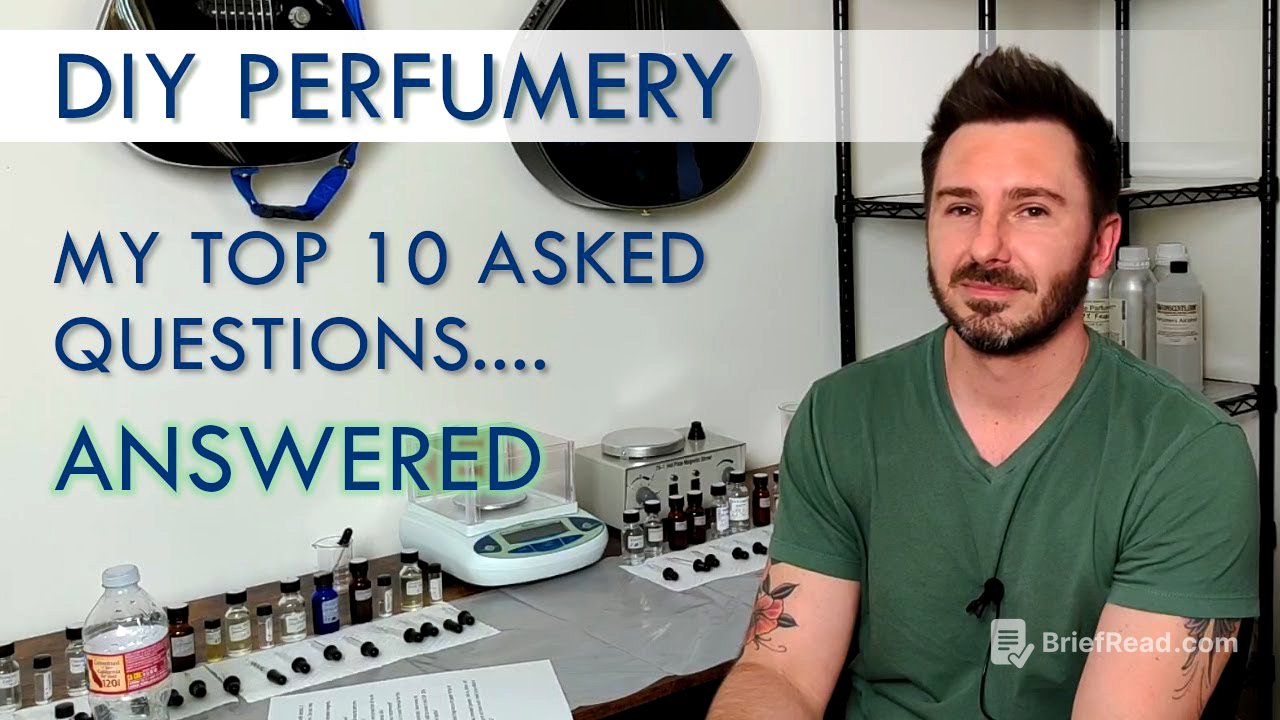TLDR;
Alright, so, this video is all about answering the top 10 most common questions BK Scents gets about perfumery. He talks about everything from why your perfume oils aren't working in alcohol, to how to figure out pre-dilution, and whether you should test on skin or paper.
- Don't use fragrance oils for alcoholic perfumes.
- No single ingredient can magically boost longevity and projection.
- Natural perfumes might not smell as good or last as long as you think.
- Get a good scale for accurate measurements.
- Research and math are your friends when pre-diluting materials.
Intro [0:06]
BK Scents is gonna tackle the most frequently asked questions he gets on his channel. People hit him up everywhere, comments, Facebook, even his personal email. He's compiled a list of the top 10 questions to hopefully clear things up for everyone. He requests not to be offended if you find your question here, as everyone starts somewhere.
Perfume Oils and Alcohol [1:45]
So, someone's trying to mix perfume oils with alcohol and it's not smelling like real perfume. The short answer is, it won't work. Fragrance oils or perfume oils are oil-based, usually diluted in carrier oils like jojoba or coconut oil. These aren't meant for spray-on alcohol perfumes. You can use them for candles, soaps, or diffusers, but not for alcoholic sprays. Because it's oil-based, it'll just sit on your skin and won't project. Plus, these oils are often knockoffs, so adding alcohol won't magically create a designer fragrance.
Single Material for Longevity and Projection [4:04]
Is there a single ingredient you can add to boost longevity, projection, and sillage? Nope. The whole perfume composition matters. It's about how all the materials work together. There are some oily substances like glucam p20 or p40 that can help top notes last longer by keeping them close to the skin. But, this can also dampen the overall projection. So, you might gain longevity but lose some of that oomph. If you want better projection, choose materials known for projecting well. Experiment and find out what works.
Number of Materials Owned [7:15]
Someone asked how many materials BK Scents owns. As of mid-February, he's got a little over 400 different materials. It might sound like a lot, but he feels like it's not even half of what he wants. Building a material library takes time and money. He stores everything in drawers and shelves, keeping what he's working on out in the open.
All-Natural Perfume [8:29]
Can he show how to make an all-natural perfume using only real natural ingredients? He can, but he won't. While he understands the appeal, all-natural ingredients generally don't project or last as long as synthetics. In his opinion, an all-natural perfume will probably smell like "hippie juice." Raw natural materials often don't smell that pleasant on their own. For example, natural rose absolute can smell dirty. Most store-bought perfumes are 80-90% synthetic anyway, with maybe a touch of natural ingredients for support.
Increasing Longevity of All-Natural Perfume [11:30]
How can you increase the longevity and projection of an all-natural perfume using only essential oils? Well, as he already explained, you can't really. A synthetic bergamot will usually be zestier, brighter, and last longer than the natural version. He combines both natural and synthetic materials in his perfumes. You get the realism of naturals with the lift and longevity of synthetics. Synthetics can also add a unique twist to the natural scent.
Recommended Weight Scale [14:03]
What kind of weight scale does he recommend? Get a scale, don't use drops. You'll never get accurate formulas that way. He uses a US Solid scale, but there are many rebranded versions out there. Look for these factors: weight capacity (how much it can hold) and readability (how many decimal points it shows). If you're making small batches, a scale that goes up to 200 grams is fine. For larger batches, you'll need a bigger scale. He likes a scale that reads to 0.003 grams for better accuracy. Also, find a scale that's accurate to plus or minus 0.003 grams. Expect to spend at least $60 for a decent scale.
Drops in Formula [18:05]
People often ask how many drops of each material are in his formulas. It doesn't matter. A formula is a formula, whether it's broken down as a percentage or parts per thousand. Don't think of it in terms of drops. Again, get a scale and stop using drops.
Grams vs Milliliters [19:12]
Someone has 20 grams of perfume concentrate and wants to know how many milliliters of alcohol to add to make a 20% EDP in a 100 ml bottle. The problem is, they're confusing weight (grams) with volume (milliliters). One gram doesn't necessarily equal one milliliter. The weight of the material changes things. Cedarwood oil is heavy, so 5 grams might not look like 5 ml. Bergamot oil is light, so it might be closer. Don't mix up weight and volume. To answer the question, add 80 grams of alcohol to the 20 grams of perfume to get a 20% concentration by weight. But, that might not fill a 100 ml bottle exactly. Always make more than you need and use the extra as testers.
Testing Fragrances [23:28]
Do you test finished fragrances on paper strips or skin? Test it based on the intended use. If it's a spray perfume, test it on your skin, clothes, and other people. Skin chemistry varies. If it's a roll-on, test it as a roll-on. Roll-ons smell different than sprays because they have less alcohol and more oil. If you're making candles or soaps, test it in a small batch of soap or candle. Smell it as you intend to use it.
Pre-Diluting Materials [25:55]
How do you figure out how much to pre-dilute a material? First, you gotta learn by using the material. If it's too strong, you'll know to dilute it. To figure out how much, scour the internet. Websites like goodsensecompany.com often have recommended dilutions. Also, research demo formulas from big fragrance houses. For example, he pre-dilutes jasmatone to 5%. He initially tried 10%, but it was too strong. You can Google "jasmatone demo formula" to find examples. If you're not sure what to dilute something at, look at demo formulas and see how they're using it. Math is important. You need to know how to calculate the dilution ratio to get the desired parts per thousand. He has a formula spreadsheet calculator that can help. Find the video and download it. It does all the calculations for you.
Outro [31:57]
Those were the top 10 questions. This video went longer than he expected. Until next time!









